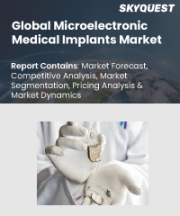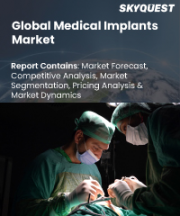
|
시장보고서
상품코드
1876501
의료용 임플란트 시장 : 산업 분석, 규모, 점유율, 성장, 동향, 예측(2025-2032년)Medical Implants Market: Global Industry Analysis, Size, Share, Growth, Trends, and Forecast, 2025 - 2032 |
||||||
Persistence Market Research는 세계의 의료용 임플란트 시장에 대한 종합적인 보고서를 발표했습니다. 이 보고서는 시장을 견인하는 요인, 새로운 동향, 기회, 과제 등 주요 시장 역학에 대한 상세한 분석을 제공합니다. 시장 정세에 관한 상세한 이해를 촉구하고 이해관계자 쪽이 정보에 근거한 의사결정을 실시하는 일조가 되는 것을 목적으로 하고 있습니다.
주요 견해:
- 의료용 임플란트 시장 규모(2025년) : 1,216억 달러
- 예측되는 시장 매출(2032년) : 1,964억 달러
- 세계 시장 성장률(2025-2032년 CAGR) : 7.1%
의료용 임플란트 시장 - 조사 범위:
의료용 임플란트 시장은 생체 구조와 기능을 대체, 보조 또는 강화하기 위해 설계된 광범위한 장치를 포함합니다. 이 임플란트는 정형외과, 심장혈관, 치과, 신경학, 미용 성형 등의 치료에 널리 사용됩니다. 세계적인 노화 인구 증가, 만성 질환의 유병률 증가, 첨단 의료 솔루션에 대한 의식이 증가함에 따라 의료용 임플란트 수요는 계속 급증하고 있습니다. 생체재료와 저침습 수술의 기술적 진보도 이 시장의 확대를 더욱 뒷받침하고 있습니다.
시장 성장 촉진요인:
세계의 의료용 임플란트 시장의 성장은 여러 주요 요인에 의해 추진되고 있습니다. 심혈관 질환, 정형외과 질환, 신경 질환과 같은 만성 질환의 유병률 증가는 임플란트를 필요로 하는 수술 개입 증가로 이어집니다. 특히 선진국 지역의 급속한 고령화는 정형외과용 및 심혈관용 임플란트 수요에 크게 기여하고 있습니다. 또한, 생체적합성 금속, 세라믹, 폴리머 등의 생체재료 기술 혁신에 의해 임플란트의 내구성과 성능이 향상되었습니다. 저침습 수술 증가 동향에 더하여, 신흥 시장에서의 의료 인프라 개선과 의료비 지출 증가도 시장 성장을 견인하는 중요한 역할을 하고 있습니다.
시장 성장 억제요인:
높은 성장 가능성에도 불구하고 의료용 임플란트 시장에는 몇 가지 제약이 있습니다. 임플란트 수술 및 장치와 관련된 높은 비용은 특히 저소득 및 중소득 국가에서 접근 장벽이 될 수 있습니다. 게다가, 임플란트 거부 반응, 감염, 장치 고장과 관련된 합병증은 환자의 치료 결과에 위험을 초래하여 널리 사용되는 것을 방해할 수 있습니다. 신규 임플란트 기술에 대한 규제 과제와 승인 프로세스의 장기화는 또한 시장의 혁신 속도를 저해할 수 있습니다. 게다가, 특정 지역에서 숙련된 전문가의 부족과 낮은 인식은 시장 침투를 제한하는 요인이 될 수 있습니다.
시장 기회:
의료용 임플란트 시장에는 큰 기회가 기다리고 있습니다. 실시간 모니터링 및 진단을 가능하게 하는 스마트 기술과 센서를 임플란트에 통합하면 새로운 혁신의 길을 열고 있습니다. 3D 프린팅 기술과 조직 공학의 진보로 개별 환자의 해부학적 구조에 맞춘 커스텀 임플란트의 개발이 가능해져 수술의 성과가 향상되고 있습니다. 아시아태평양과 라틴아메리카의 신흥 시장에서는 의료 시스템 개선, 의료 관광 확대, 고품질 의료 수요 증가로 인해 엄청난 성장 가능성이 예상됩니다. 또한 임플란트 제조업체, 병원 및 연구 기관 간의 전략적 제휴는 차세대 임플란트 솔루션의 도입을 가속화할 것입니다.
이 보고서에서 답변을 얻을 수 있는 주요 질문:
- 세계의 의료용 임플란트 시장의 성장을 견인하는 주요 요인은?
- 어떤 제품 부문 및 지역에서 가장 높은 수요가 예상되는가?
- 생체 재료의 혁신은 의료용 임플란트의 설계와 성능에 어떤 영향을 미치는가?
- 의료용 임플란트 시장의 주요 기업은 어떤 기업이며 경쟁 우위를 유지하기 위해 어떤 전략을 채택하고 있는가?
- 세계의 의료용 임플란트 시장 전망을 형성하는 새로운 동향은 무엇인가?
목차
제1장 주요 요약
제2장 시장 개요
- 시장의 범위와 정의
- 시장 역학
- 성장 촉진요인
- 억제요인
- 기회
- 과제
- 주요 동향
- 거시경제 요인
- COVID-19의 영향 분석
- 예측 요인- 관련성과 영향
제3장 부가가치가 있는 통찰
- 규제 상황
- 제품 채용 분석
- 밸류체인 분석
- 주요 거래와 합병
- PESTLE 분석
- Porter's Five Forces 분석
제4장 세계의 의료용 임플란트 시장 전망:
- 주요 하이라이트
- 시장 규모와 전년대비 성장률
- 절대 수익 기회
- 시장 규모의 분석과 예측
- 과거 시장 규모 분석, 2019-2024년
- 현재 시장 규모의 분석과 예측, 2025-2032년
- 세계의 의료용 임플란트 시장 전망 : 제품 유형별
- 소개/주요 조사 결과
- 과거 시장 규모 분석, 제품 유형별, 2019-2024년
- 현재 시장 규모 분석과 예측, 제품 유형별, 2025-2032년
- 정형외과 임플란트
- 심장혈관 임플란트
- 스텐트
- 스텐트 관련 임플란트
- 구조적 심장 임플란트
- 척추 임플란트
- 신경 자극 장치
- 안과 임플란트
- 치과 임플란트
- 안면 임플란트
- 유방 임플란트
- 시장 매력 분석 : 제품 유형
- 세계의 의료용 임플란트 시장 전망 : 생체 재료 유형별
- 소개/주요 조사 결과
- 과거 시장 규모 분석, 생체 재료 유형별, 2019-2024년
- 현재 시장 규모 분석과 예측, 생체 재료 유형별, 2025-2032년
- 금속 생체 재료
- 세라믹 생체 재료
- 폴리머 생체 재료
- 천연 생체 재료
- 시장 매력 분석 : 생체 재료 유형
제5장 세계의 의료용 임플란트 시장 전망 : 지역별
- 주요 하이라이트
- 과거 시장 규모 분석, 제품 유형별, 2019-2024년
- 현재 시장 규모 분석과 예측, 제품 유형별, 2025-2032년
- 북미
- 유럽
- 동아시아
- 남아시아 및 오세아니아
- 라틴아메리카
- 중동 및 아프리카
- 시장 매력 분석 : 지역
제6장 북미의 의료용 임플란트 시장 전망
제7장 유럽의 의료용 임플란트 시장 전망:
제8장 동아시아의 의료용 임플란트 시장 전망
제9장 남아시아 및 오세아니아의 의료용 임플란트 시장 전망:
제10장 라틴아메리카의 의료용 임플란트 시장 전망:
제11장 중동 및 아프리카의 의료용 임플란트 시장 전망:
제12장 경쟁 구도
- 시장 점유율 분석, 2025년
- 시장 제품 유형
- 시장별 경쟁 강도 매핑
- 경쟁 대시보드
- 기업 프로파일(상세 - 개요, 재무, 전략, 최근 동향)
- Johnson & Johnson Limited
- Abbott Laboratories
- Edwards Lifesciences Corporation
- Orthofix International NV
- Novartis International AG
- Sorin SpA
- Boston Scientific Corporation
- Smith & Nephew plc
- Tornier NV
- Stryker Corporation
제13장 부록
- 조사 방법
- 조사의 전제
- 두자어 및 약어
Persistence Market Research has recently released a comprehensive report on the global Medical Implants Market, providing an in-depth analysis of key market dynamics, including driving forces, emerging trends, opportunities, and challenges. This report offers a detailed understanding of the market landscape, helping stakeholders make well-informed decisions.
Key Insights:
- Medical Implants Market Size (2025E): US$ 121.6 Bn
- Projected Market Value (2032F): US$ 196.4 Bn
- Global Market Growth Rate (CAGR 2025 to 2032): 7.1%
Medical Implants Market - Report Scope:
The medical implants market includes a wide range of devices designed to replace, support, or enhance biological structures or functions. These implants are widely used in orthopedic, cardiovascular, dental, neurological, and cosmetic procedures. With a rising global geriatric population, increasing prevalence of chronic conditions, and growing awareness of advanced healthcare solutions, the demand for medical implants continues to surge. Technological advancements in biomaterials and minimally invasive surgeries further support the expansion of this market.
Market Growth Drivers:
The growth of the global medical implants market is driven by multiple key factors. The increasing prevalence of chronic diseases such as cardiovascular disorders, orthopedic conditions, and neurological issues has led to a rise in surgical interventions requiring implants. A rapidly aging population, especially in developed regions, is contributing significantly to the demand for orthopedic and cardiovascular implants. Moreover, technological innovations in biomaterials, such as biocompatible metals, ceramics, and polymers, have enhanced the durability and performance of implants. The growing trend of minimally invasive surgeries, combined with improved healthcare infrastructure and increased healthcare spending across emerging markets, also plays a pivotal role in driving market growth.
Market Restraints:
Despite strong growth potential, the medical implants market faces several restraints. High costs associated with implant procedures and devices can be a barrier to access, particularly in low- and middle-income countries. Additionally, complications related to implant rejection, infections, and device failures can pose risks to patient outcomes and deter wider adoption. Regulatory challenges and lengthy approval processes for new implant technologies may also hinder the market's pace of innovation. Furthermore, the lack of skilled professionals and inadequate awareness in certain regions can limit market penetration.
Market Opportunities:
Significant opportunities lie ahead for the medical implants market. The integration of smart technologies and sensors in implants for real-time monitoring and diagnostics is creating new avenues for innovation. Advancements in 3D printing and tissue engineering are enabling the development of customized implants tailored to individual patient anatomies, enhancing surgical outcomes. Emerging markets in Asia-Pacific and Latin America offer immense growth potential due to improving healthcare systems, expanding medical tourism, and rising demand for quality care. Additionally, strategic collaborations between implant manufacturers, hospitals, and research institutes can accelerate the adoption of next-generation implant solutions.
Key Questions Answered in the Report:
- What are the primary factors driving the global medical implants market's growth?
- Which product segments and regions are expected to experience the highest demand?
- How are biomaterial innovations influencing the design and performance of medical implants?
- Who are the major players in the medical implants market, and what strategies are they adopting to maintain a competitive edge?
- What are the emerging trends shaping the future of the global medical implants market?
Competitive Intelligence and Business Strategy:
Leading companies in the global medical implants market, such as Johnson & Johnson Limited, Abbott Laboratories, and Boston Scientific Corporation, are focusing on technological innovation, expanding product portfolios, and investing in R&D to enhance implant functionality and patient outcomes. Strategic acquisitions, collaborations with healthcare providers, and expansion into emerging markets are common growth strategies. Companies are also prioritizing the development of bioresorbable and smart implants to meet the evolving needs of modern medicine. With a competitive landscape marked by rapid innovation and high investment in biocompatibility and sustainability, market players are working to strengthen their global footprint and brand reputation.
Companies Covered in This Report:
- Johnson & Johnson Limited
- Abbott Laboratories
- Edwards Lifesciences Corporation
- Orthofix International N.V.
- Novartis International AG
- Sorin S.p.A
- Boston Scientific Corporation
- Smith & Nephew plc
- Tornier N.V.
- Stryker Corporation
Market Segmentation:
By Product Type:
- Orthopedic Implants
- Cardiovascular Implants
- Stents
- Stent-related Implants
- Structural Cardiac Implants
- Spinal Implants
- Neurostimulators
- Ophthalmic Implants
- Dental Implants
- Facial Implants
- Breast Implants
By Biomaterial Type:
- Metallic Biomaterials
- Ceramic Biomaterials
- Polymers Biomaterials
- Natural Biomaterials
By Region:
- North America
- Europe
- East Asia
- South Asia and Oceania
- Latin America
- Middle East and Africa
Table of Contents
1. Executive Summary
- 1.1. Global Medical Implants Market Snapshot, 2025 and 2032
- 1.2. Market Opportunity Assessment, 2025-2032, US$ Bn
- 1.3. Key Market Trends
- 1.4. Future Market Projections
- 1.5. Premium Market Insights
- 1.6. Industry Developments and Key Market Events
- 1.7. PMR Analysis and Recommendations
2. Market Overview
- 2.1. Market Scope and Definition
- 2.2. Market Dynamics
- 2.2.1. Drivers
- 2.2.2. Restraints
- 2.2.3. Opportunity
- 2.2.4. Challenges
- 2.2.5. Key Trends
- 2.3. Macro-Economic Factors
- 2.3.1. Global Sectorial Outlook
- 2.3.2. Global GDP Growth Outlook
- 2.4. COVID-19 Impact Analysis
- 2.5. Forecast Factors - Relevance and Impact
3. Value Added Insights
- 3.1. Regulatory Landscape
- 3.2. Product Adoption Analysis
- 3.3. Value Chain Analysis
- 3.4. Key Deals and Mergers
- 3.5. PESTLE Analysis
- 3.6. Porter's Five Force Analysis
4. Global Medical Implants Market Outlook:
- 4.1. Key Highlights
- 4.1.1. Market Size (US$ Bn) and Y-o-Y Growth
- 4.1.2. Absolute $ Opportunity
- 4.2. Market Size (US$ Bn) Analysis and Forecast
- 4.2.1. Historical Market Size (US$ Bn) Analysis, 2019-2024
- 4.2.2. Current Market Size (US$ Bn) Analysis and Forecast, 2025-2032
- 4.3. Global Medical Implants Market Outlook: Product Type
- 4.3.1. Introduction / Key Findings
- 4.3.2. Historical Market Size (US$ Bn) Analysis, By Product Type, 2019-2024
- 4.3.3. Current Market Size (US$ Bn) Analysis and Forecast, By Product Type, 2025-2032
- 4.3.3.1. Orthopedic Implants
- 4.3.3.2. Cardiovascular Implants
- 4.3.3.3. Stents
- 4.3.3.4. Stent-related Implants
- 4.3.3.5. Structural Cardiac Implants
- 4.3.3.6. Spinal Implants
- 4.3.3.7. Neurostimulators
- 4.3.3.8. Ophthalmic Implants
- 4.3.3.9. Dental Implants
- 4.3.3.10. Facial Implants
- 4.3.3.11. Breast Implants
- 4.3.4. Market Attractiveness Analysis: Product Type
- 4.4. Global Medical Implants Market Outlook: Biomaterial Type
- 4.4.1. Introduction / Key Findings
- 4.4.2. Historical Market Size (US$ Bn) Analysis, By Biomaterial Type, 2019-2024
- 4.4.3. Current Market Size (US$ Bn) Analysis and Forecast, By Biomaterial Type, 2025-2032
- 4.4.3.1. Metallic Biomaterials
- 4.4.3.2. Ceramic Biomaterials
- 4.4.3.3. Polymers Biomaterials
- 4.4.3.4. Natural Biomaterials
- 4.4.4. Market Attractiveness Analysis: Biomaterial Type
5. Global Medical Implants Market Outlook: Region
- 5.1. Key Highlights
- 5.2. Historical Market Size (US$ Bn) Analysis, By Region, 2019-2024
- 5.3. Current Market Size (US$ Bn) Analysis and Forecast, By Region, 2025-2032
- 5.3.1. North America
- 5.3.2. Europe
- 5.3.3. East Asia
- 5.3.4. South Asia and Oceania
- 5.3.5. Latin America
- 5.3.6. Middle East & Africa
- 5.4. Market Attractiveness Analysis: Region
6. North America Medical Implants Market Outlook:
- 6.1. Key Highlights
- 6.2. Historical Market Size (US$ Bn) Analysis, By Market, 2019-2024
- 6.2.1. By Country
- 6.2.2. By Product Type
- 6.2.3. By Biomaterial Type
- 6.3. Current Market Size (US$ Bn) Analysis and Forecast, By Country, 2025-2032
- 6.3.1. U.S.
- 6.3.2. Canada
- 6.4. Current Market Size (US$ Bn) Analysis and Forecast, By Product Type, 2025-2032
- 6.4.1. Orthopedic Implants
- 6.4.2. Cardiovascular Implants
- 6.4.3. Stents
- 6.4.4. Stent-related Implants
- 6.4.5. Structural Cardiac Implants
- 6.4.6. Spinal Implants
- 6.4.7. Neurostimulators
- 6.4.8. Ophthalmic Implants
- 6.4.9. Dental Implants
- 6.4.10. Facial Implants
- 6.4.11. Breast Implants
- 6.5. Current Market Size (US$ Bn) Analysis and Forecast, By Biomaterial Type, 2025-2032
- 6.5.1. Metallic Biomaterials
- 6.5.2. Ceramic Biomaterials
- 6.5.3. Polymers Biomaterials
- 6.5.4. Natural Biomaterials
- 6.6. Market Attractiveness Analysis
7. Europe Medical Implants Market Outlook:
- 7.1. Key Highlights
- 7.2. Historical Market Size (US$ Bn) Analysis, By Market, 2019-2024
- 7.2.1. By Country
- 7.2.2. By Product Type
- 7.2.3. By Biomaterial Type
- 7.3. Current Market Size (US$ Bn) Analysis and Forecast, By Country, 2025-2032
- 7.3.1. Germany
- 7.3.2. France
- 7.3.3. U.K.
- 7.3.4. Italy
- 7.3.5. Spain
- 7.3.6. Russia
- 7.3.7. Turkey
- 7.3.8. Rest of Europe
- 7.4. Current Market Size (US$ Bn) Analysis and Forecast, By Product Type, 2025-2032
- 7.4.1. Orthopedic Implants
- 7.4.2. Cardiovascular Implants
- 7.4.3. Stents
- 7.4.4. Stent-related Implants
- 7.4.5. Structural Cardiac Implants
- 7.4.6. Spinal Implants
- 7.4.7. Neurostimulators
- 7.4.8. Ophthalmic Implants
- 7.4.9. Dental Implants
- 7.4.10. Facial Implants
- 7.4.11. Breast Implants
- 7.5. Current Market Size (US$ Bn) Analysis and Forecast, By Biomaterial Type, 2025-2032
- 7.5.1. Metallic Biomaterials
- 7.5.2. Ceramic Biomaterials
- 7.5.3. Polymers Biomaterials
- 7.5.4. Natural Biomaterials
- 7.6. Market Attractiveness Analysis
8. East Asia Medical Implants Market Outlook:
- 8.1. Key Highlights
- 8.2. Historical Market Size (US$ Bn) Analysis, By Market, 2019-2024
- 8.2.1. By Country
- 8.2.2. By Product Type
- 8.2.3. By Biomaterial Type
- 8.3. Current Market Size (US$ Bn) Analysis and Forecast, By Country, 2025-2032
- 8.3.1. China
- 8.3.2. Japan
- 8.3.3. South Korea
- 8.4. Current Market Size (US$ Bn) Analysis and Forecast, By Product Type, 2025-2032
- 8.4.1. Orthopedic Implants
- 8.4.2. Cardiovascular Implants
- 8.4.3. Stents
- 8.4.4. Stent-related Implants
- 8.4.5. Structural Cardiac Implants
- 8.4.6. Spinal Implants
- 8.4.7. Neurostimulators
- 8.4.8. Ophthalmic Implants
- 8.4.9. Dental Implants
- 8.4.10. Facial Implants
- 8.4.11. Breast Implants
- 8.5. Current Market Size (US$ Bn) Analysis and Forecast, By Biomaterial Type, 2025-2032
- 8.5.1. Metallic Biomaterials
- 8.5.2. Ceramic Biomaterials
- 8.5.3. Polymers Biomaterials
- 8.5.4. Natural Biomaterials
- 8.6. Market Attractiveness Analysis
9. South Asia & Oceania Medical Implants Market Outlook:
- 9.1. Key Highlights
- 9.2. Historical Market Size (US$ Bn) Analysis, By Market, 2019-2024
- 9.2.1. By Country
- 9.2.2. By Product Type
- 9.2.3. By Biomaterial Type
- 9.3. Current Market Size (US$ Bn) Analysis and Forecast, By Country, 2025-2032
- 9.3.1. India
- 9.3.2. Southeast Asia
- 9.3.3. ANZ
- 9.3.4. Rest of South Asia & Oceania
- 9.4. Current Market Size (US$ Bn) Analysis and Forecast, By Product Type, 2025-2032
- 9.4.1. Orthopedic Implants
- 9.4.2. Cardiovascular Implants
- 9.4.3. Stents
- 9.4.4. Stent-related Implants
- 9.4.5. Structural Cardiac Implants
- 9.4.6. Spinal Implants
- 9.4.7. Neurostimulators
- 9.4.8. Ophthalmic Implants
- 9.4.9. Dental Implants
- 9.4.10. Facial Implants
- 9.4.11. Breast Implants
- 9.5. Current Market Size (US$ Bn) Analysis and Forecast, By Biomaterial Type, 2025-2032
- 9.5.1. Metallic Biomaterials
- 9.5.2. Ceramic Biomaterials
- 9.5.3. Polymers Biomaterials
- 9.5.4. Natural Biomaterials
- 9.6. Market Attractiveness Analysis
10. Latin America Medical Implants Market Outlook:
- 10.1. Key Highlights
- 10.2. Historical Market Size (US$ Bn) Analysis, By Market, 2019-2024
- 10.2.1. By Country
- 10.2.2. By Product Type
- 10.2.3. By Biomaterial Type
- 10.3. Current Market Size (US$ Bn) Analysis and Forecast, By Country, 2025-2032
- 10.3.1. Brazil
- 10.3.2. Mexico
- 10.3.3. Rest of Latin America
- 10.4. Current Market Size (US$ Bn) Analysis and Forecast, By Product Type, 2025-2032
- 10.4.1. Orthopedic Implants
- 10.4.2. Cardiovascular Implants
- 10.4.3. Stents
- 10.4.4. Stent-related Implants
- 10.4.5. Structural Cardiac Implants
- 10.4.6. Spinal Implants
- 10.4.7. Neurostimulators
- 10.4.8. Ophthalmic Implants
- 10.4.9. Dental Implants
- 10.4.10. Facial Implants
- 10.4.11. Breast Implants
- 10.5. Current Market Size (US$ Bn) Analysis and Forecast, By Biomaterial Type, 2025-2032
- 10.5.1. Metallic Biomaterials
- 10.5.2. Ceramic Biomaterials
- 10.5.3. Polymers Biomaterials
- 10.5.4. Natural Biomaterials
- 10.6. Market Attractiveness Analysis
11. Middle East & Africa Medical Implants Market Outlook:
- 11.1. Key Highlights
- 11.2. Historical Market Size (US$ Bn) Analysis, By Market, 2019-2024
- 11.2.1. By Country
- 11.2.2. By Product Type
- 11.2.3. By Biomaterial Type
- 11.3. Current Market Size (US$ Bn) Analysis and Forecast, By Country, 2025-2032
- 11.3.1. GCC Countries
- 11.3.2. Egypt
- 11.3.3. South Africa
- 11.3.4. Northern Africa
- 11.3.5. Rest of Middle East & Africa
- 11.4. Current Market Size (US$ Bn) Analysis and Forecast, By Product Type, 2025-2032
- 11.4.1. Orthopedic Implants
- 11.4.2. Cardiovascular Implants
- 11.4.3. Stents
- 11.4.4. Stent-related Implants
- 11.4.5. Structural Cardiac Implants
- 11.4.6. Spinal Implants
- 11.4.7. Neurostimulators
- 11.4.8. Ophthalmic Implants
- 11.4.9. Dental Implants
- 11.4.10. Facial Implants
- 11.4.11. Breast Implants
- 11.5. Current Market Size (US$ Bn) Analysis and Forecast, By Biomaterial Type, 2025-2032
- 11.5.1. Metallic Biomaterials
- 11.5.2. Ceramic Biomaterials
- 11.5.3. Polymers Biomaterials
- 11.5.4. Natural Biomaterials
- 11.6. Market Attractiveness Analysis
12. Competition Landscape
- 12.1. Market Share Analysis, 2025
- 12.2. Market Product Type
- 12.2.1. Competition Intensity Mapping By Market
- 12.2.2. Competition Dashboard
- 12.3. Company Profiles (Details - Overview, Financials, Strategy, Recent Developments)
- 12.3.1. Johnson & Johnson Limited
- 12.3.1.1. Overview
- 12.3.1.2. Segments and Products
- 12.3.1.3. Key Financials
- 12.3.1.4. Market Developments
- 12.3.1.5. Market Strategy
- 12.3.2. Abbott Laboratories
- 12.3.3. Edwards Lifesciences Corporation
- 12.3.4. Orthofix International N.V.
- 12.3.5. Novartis International AG
- 12.3.6. Sorin S.p.A
- 12.3.7. Boston Scientific Corporation
- 12.3.8. Smith & Nephew plc
- 12.3.9. Tornier N.V.
- 12.3.10. Stryker Corporation
- 12.3.1. Johnson & Johnson Limited
13. Appendix
- 13.1. Research Methodology
- 13.2. Research Assumptions
- 13.3. Acronyms and Abbreviations



















